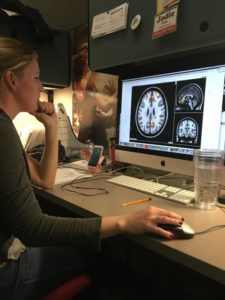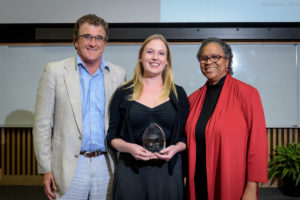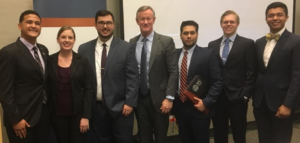Jodie Gray: Medical Physics Helps Me Combine My Love for Computer Science, Philosophy, and Physics

 Jodie Gray found her passion for physics during senior year of high school when she enrolled in a physics class. While in college at the University of West Florida in Pensacola, she realized that she was not only interested in physics but also in computer science and philosophy.
Jodie Gray found her passion for physics during senior year of high school when she enrolled in a physics class. While in college at the University of West Florida in Pensacola, she realized that she was not only interested in physics but also in computer science and philosophy.
After graduation, she wanted to weave in those experiences in a field where she could apply all her interests.
“Medical Physics is a blend of my background in computer science where I learned about data mining methods. In philosophy, I learned about the theory of mind,” she said. “I like theoretical physics, but in the medical field you (a physicist) will always be needed.”
Gray is currently a fifth-year graduate student in the Radiological Sciences Ph.D. program with a concentration in Diagnostic Medical Physics and Neuroscience Imaging. She’s currently working in the Research Imaging Institute under Dr. Peter T. Fox.
The focus of Jodie’s research is on MRI imaging in major depressive disorder. Gray’s approach is different than the rest because she examines brain scans from patients with major depressive disorder, then searches for an observable signature of depression on the brain.
“Depression isn’t like progressive like Alzheimer’s or disease, you can go years without having an episode and then have one,” she explained. “I hope that one day my research may pose a profound change in the stigma that sometimes surrounds mental illness.”
 Gray chose UT Health San Antonio because it’s one of the few schools that are accredited with CAMPEP Graduate Programs in Medical Physics.
Gray chose UT Health San Antonio because it’s one of the few schools that are accredited with CAMPEP Graduate Programs in Medical Physics.
Her favorite part about the school is that “students and faculty are more supportive than what I’ve seen in other institutions.”
She has always been interested in policy and administration of science. To help impact policy in graduate education, she joined the UT System Student Advisory Council where she served as chair. During her time with the council, she helped pass an initiative which allocated 7.4 million to fund 10 different campus-based programs to support student safety and wellness.
In addition, Jodie served as the president of the Graduate Student Association where she helped organize the annual Mikiten Research Symposium which had a spotlight on mental health and wellness for graduate students.
“GSA is about advocating locally for graduate students while the UT System Student Advisory Council advocates nationally,” Gray said. “It’s interesting to see how a small change in wording can change the world. The right policy help things to be more efficient.”
Gray was recognized for her phenomenal accomplishments when she was chosen for the Joe and Patty Robles Leadership Award in 2018.
“It was a great honor” Gray said.

In the future, Jodie plans to work in the medical physics field. In her spare time, Jodie likes to hang out with her boyfriend and her dog during her free time.
Gray’s advice for the students is “be humble and do something beyond your research. It will help your mental health!”
 This article was written by Yi-Ting Chung, communications intern at the Graduate School of Biomedical Sciences at UT Health San Antonio. Chung is currently pursuing her bachelor’s degree in Communication and Media Studies with a minor in Business Administration at The University of Texas at San Antonio.
This article was written by Yi-Ting Chung, communications intern at the Graduate School of Biomedical Sciences at UT Health San Antonio. Chung is currently pursuing her bachelor’s degree in Communication and Media Studies with a minor in Business Administration at The University of Texas at San Antonio.
